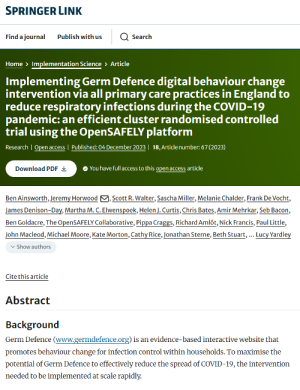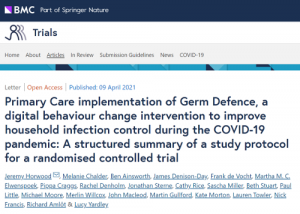Roll-out of Germ Defence website through GP practices during the COVID-19 pandemic
Germ Defence is a behaviour change website based on scientific evidence that gives practical advice on how to reduce the spread of infection in the home.
In a randomised controlled trial in more than 20,000 households, using Germ Defence reduced the spread of seasonal and swine flu. It helped reduce the risk of these respiratory infections by around 14 per cent, and reduced the number of GP visits and antibiotic prescriptions needed by people who used the website. During the COVID-19 pandemic, the website was updated with advice relevant to the pandemic [www.germdefence.org/].
Germ Defence provides simple, tailored advice to help people reduce virus spread at home. This covers a variety of topics, such as the importance of opening windows to keep rooms well-ventilated, as well as reminders about cleaning surfaces and washing hands. Using behaviour change techniques, it helped people think through and adopt better home hygiene habits and find ways to solve any barriers.
A series of questions on the website took around 10 minutes to answer. People then got tailored advice to fit their personal circumstances, designed to help them make lasting changes. The website was translated into more than 20 languages.
This study was funded by UK Research and Innovation (UKRI) and the National Institute for Health and Care Research (NIHR).
Project aims
We wanted to see if Germ Defence could help people protect themselves, and those they lived with, from COVID-19 and other infections such as colds, flu, and stomach bugs. We also wanted to know if it reduced healthcare use such as GP visits, antibiotic prescriptions, and hospital admissions.
The design of the study also pushed boundaries so that Germ Defence could be rolled out quickly during the pandemic. To reduce the burden on GP practices and patients, the study was designed so they didn’t need to send the research team any information.
National routinely collected patient records were used to examine whether the practices that sent out Germ Defence earlier reported fewer infections among their patients. A Trusted Research Environment (TRE) secure platform was used to allow researchers to access and analyse data from large numbers of health records.
We wanted to find out if our ambitious and groundbreaking study design would work.
What we did
Half of the GP practices in England were randomly selected to send out the Germ Defence website link to their patients in the autumn of 2020 (the intervention arm) via mobile phone text or email. The remaining practices were asked to do the same in spring 2021 (the control arm).
Using email addresses from NHS Digital, the team sent invitation emails to nearly 3,000 GP practices in the intervention arm. These emails contained practice specific weblinks to Germ Defence so the team could monitor website usage by practice.
This meant that GP practices and patients didn’t need to send the research team any information. The researchers could see if patients used the Germ Defence website link through anonymous website data. This showed whether patients from individual practices used the website, but it didn’t record who those patients were.
The research team also used anonymous national NHS data collected as part of routine care. This was accessed through OpenSAFELY, a Trusted Research Environment which gives researchers access to 40% of the English population’s anonymous health records.
This allowed them to compare whether infection rates and use of healthcare services were lower in practices that sent the Germ Defence link to their patients first, compared to those that sent it later.
How we involved people
Feedback from the public was vital during the redesign of Germ Defence for the pandemic and the study’s design.
A public contributor was a co-investigator on the study team. She contributed to writing the research proposal, updating, and optimising the content of the website and emails to GP practices and patients. She also co-authored academic papers.
Study materials were also reviewed by public contributors from the National Institute of Health and Care Research Clinical Research Network (NIHR CRN).
What we found and what this means
Website statistics showed that around 460 practices shared their link with patients, who then went on to use the site. This was 16% of the practices invited, but the research team had hoped that at least 25% would participate. Participation below this level means no firm conclusions can be made from the study’s results.
During the trial, Germ Defence was used 310,731 times. The average website satisfaction score was 7.52 out of 10, with 0 being not at all satisfied and 10 being very satisfied. While no significant difference in infection rates was observed between the two groups, the findings are nevertheless important.
The trial design allowed the team to safely recruit GP practices during the pandemic. They used several new techniques to reduce the burden on practices and improve the number who could take part in research. These included:
- Recruiting practices via email, removing the lengthy process of contacting individual practices (although to avoid overwhelming practices this method should only be used when rapid enrolment is necessary)
- Using unique GP practice weblinks, which allowed researchers to understand how each practice used the intervention without needing to contact the practice
- Using national routinely collected patient record data -accessed through the NHS England OpenSAFELY Service – to analyse anonymised GP records securely, demonstrating that randomised trial follow-up can be done in a Trusted Research Environment.
Further information
The trial was a collaboration between the Universities of Bristol, Bath and Southampton and was led by the NIHR Applied Research Collaboration West (NIHR ARC West) and the University of Bristol’s Centre for Academic Primary Care.
It was funded by UKRI Coronavirus Rapid Response Call, NIHR ARC West and NIHR Health Protection Research Unit in Behavioural Science and Evaluation (NIHR HPRU BSE) and supported by Health Data Research UK (HDR UK) Better Care South-West Partnership.
Ethics approval was given by the NHS Health Research Authority, Research Ethics Committee Leeds West – Yorkshire & The Humber (REC reference: 20/YH/0261).
Papers

Implementing Germ Defence digital behaviour change intervention via all primary care practices in England to reduce respiratory infections during the COVID-19 pandemic: an efficient cluster randomised controlled trial using the OpenSAFELY platform
Read the paper
Primary Care implementation of Germ Defence, a digital behaviour change intervention to improve household infection control during the COVID-19 pandemic: A structured summary of a study protocol for a randomised controlled trial
Read the paperLead collaborators
- Dr Melanie Chalder, University of Bristol
- Dr Sarah Denford, University of Bristol
- Dr Rachel Denholm, University of Bristol
- Cathy Rice, public contributor
- Professor Jonathan Sterne, University of Bristol
- Dr Ben Ainsworth, University of Bath
- Dr James Denison-Day, University of Southampton
- Dr Rosie Essery, University of Southampton
- Professor Paul Little, University of Southampton
- Sascha Miller, University of Southampton
- Professor Michael Moore, University of Southampton
- Dr Kate Morton, University of Southampton
- Dr Beth Stuart, University of Southampton
- Lauren Towler, University of Southampton
- Dr Merlin Willcox, University of Southampton
ARC West Staff
Pippa Craggs
Chief Operating OfficerProfessor Frank de Vocht
Applied Data Sciences Team Co-leadProfessor John Macleod
Professor in Clinical Epidemiology and Primary CareProfessor Lucy Yardley
Cross-cutting Methodological Theme LeadPartners on this project
University of Bath
The University of Bath is one of the UK's leading universities with an international reputation for quality research and teaching. Its mission is to deliver world class research and teaching, educating its graduates to become future leaders and innovators, and benefiting the wider population through our research, enterprise and influence.
University of Bristol
The University of Bristol is internationally renowned and one of the very best in the UK, due to its outstanding teaching and research, its superb facilities and highly talented students and staff. Its students thrive in a rich academic environment which is informed by world-leading research. It hosts the Elizabeth Blackwell Institute for Health Research.



